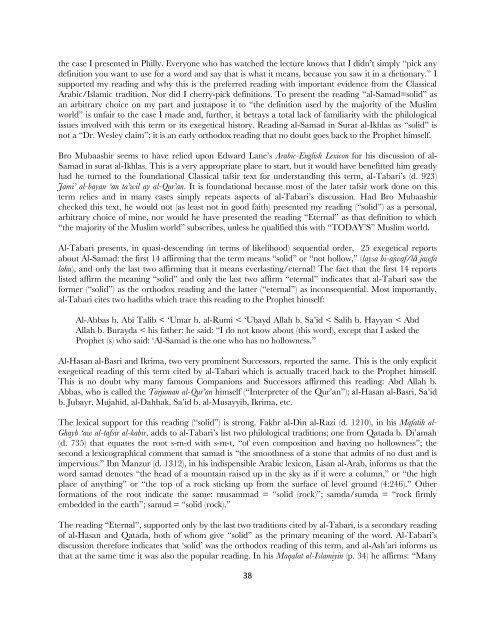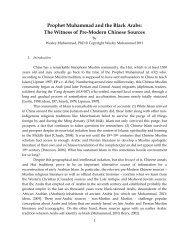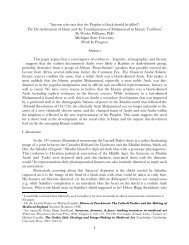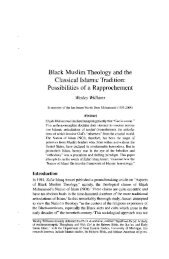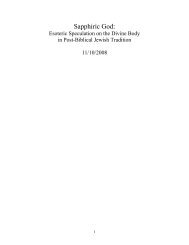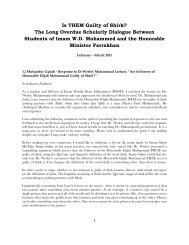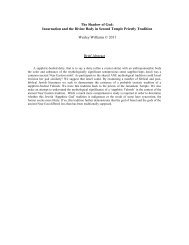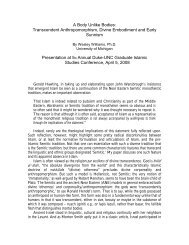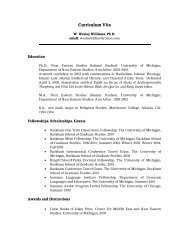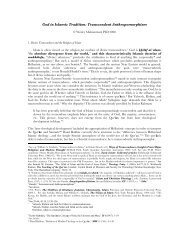Is THEM Guilty of Shirk? - Dr. Wesley Muhammad
Is THEM Guilty of Shirk? - Dr. Wesley Muhammad
Is THEM Guilty of Shirk? - Dr. Wesley Muhammad
You also want an ePaper? Increase the reach of your titles
YUMPU automatically turns print PDFs into web optimized ePapers that Google loves.
the case I presented in Philly. Everyone who has watched the lecture knows that I didn‘t simply ―pick any<br />
definition you want to use for a word and say that is what it means, because you saw it in a dictionary.‖ I<br />
supported my reading and why this is the preferred reading with important evidence from the Classical<br />
Arabic/<strong>Is</strong>lamic tradition. Nor did I cherry-pick definitions. To present the reading ―al-Samad=solid‖ as<br />
an arbitrary choice on my part and juxtapose it to ―the definition used by the majority <strong>of</strong> the Muslim<br />
world‖ is unfair to the case I made and, further, it betrays a total lack <strong>of</strong> familiarity with the philological<br />
issues involved with this term or its exegetical history. Reading al-Samad in Surat al-Ikhlas as ―solid‖ is<br />
not a ―<strong>Dr</strong>. <strong>Wesley</strong> claim‖; it is an early orthodox reading that no doubt goes back to the Prophet himself.<br />
Bro Mubaashir seems to have relied upon Edward Lane‘s Arabic-English Lexicon for his discussion <strong>of</strong> al-<br />
Samad in surat al-Ikhlas. This is a very appropriate place to start, but it would have benefitted him greatly<br />
had he turned to the foundational Classical tafsir text for understanding this term, al-Tabari‘s (d. 923)<br />
Jami‟ al-bayan „an ta‟wil ay al-Qur‟an. It is foundational because most <strong>of</strong> the later tafsir work done on this<br />
term relies and in many cases simply repeats aspects <strong>of</strong> al-Tabari‘s discussion. Had Bro Mubaashir<br />
checked this text, he would not (as least not in good faith) presented my reading (―solid‖) as a personal,<br />
arbitrary choice <strong>of</strong> mine, nor would he have presented the reading ―Eternal‖ as that definition to which<br />
―the majority <strong>of</strong> the Muslim world‖ subscribes, unless he qualified this with ―TODAY‘S‖ Muslim world.<br />
Al-Tabari presents, in quasi-descending (in terms <strong>of</strong> likelihood) sequential order, 25 exegetical reports<br />
about Al-Samad: the first 14 affirming that the term means ―solid‖ or ―not hollow,‖ (laysa bi-ajwaf/lā jawfa<br />
lahu), and only the last two affirming that it means everlasting/eternal! The fact that the first 14 reports<br />
listed affirm the meaning ―solid‖ and only the last two affirm ―eternal‖ indicates that al-Tabari saw the<br />
former (―solid‖) as the orthodox reading and the latter (―eternal‖) as inconsequential. Most importantly,<br />
al-Tabari cites two hadiths which trace this reading to the Prophet himself:<br />
Al-Abbas b. Abi Talib < ‗Umar b. al-Rumi < ‗Ubayd Allah b. Sa‘id < Salih b. Hayyan < Abd<br />
Allah b. Burayda < his father: he said: ―I do not know about (this word), except that I asked the<br />
Prophet (s) who said: ‗Al-Samad is the one who has no hollowness.‖<br />
Al-Hasan al-Basri and Ikrima, two very prominent Successors, reported the same. This is the only explicit<br />
exegetical reading <strong>of</strong> this term cited by al-Tabari which is actually traced back to the Prophet himself.<br />
This is no doubt why many famous Companions and Successors affirmed this reading: Abd Allah b.<br />
Abbas, who is called the Tarjuman al-Qur‟an himself (―Interpreter <strong>of</strong> the Qur‘an‖); al-Hasan al-Basri, Sa‘id<br />
b. Jubayr, Mujahid, al-Dahhak, Sa‘id b. al-Musayyib, Ikrima, etc.<br />
The lexical support for this reading (―solid‖) is strong. Fakhr al-Din al-Razi (d. 1210), in his Mafatih al-<br />
Ghayb „aw al-tafsir al-kabir, adds to al-Tabari‘s list two philological traditions; one from Qatada b. Di‘amah<br />
(d. 735) that equates the root s-m-d with s-m-t, ―<strong>of</strong> even composition and having no hollowness‖; the<br />
second a lexicographical comment that samad is ―the smoothness <strong>of</strong> a stone that admits <strong>of</strong> no dust and is<br />
impervious.‖ Ibn Manzur (d. 1312), in his indispensible Arabic lexicon, Lisan al-Arab, informs us that the<br />
word samad denotes ―the head <strong>of</strong> a mountain raised up in the sky as if it were a column,‖ or ―the high<br />
place <strong>of</strong> anything‖ or ―the top <strong>of</strong> a rock sticking up from the surface <strong>of</strong> level ground (4:246).‖ Other<br />
formations <strong>of</strong> the root indicate the same: musammad = ―solid (rock)‖; samda/sumda = ―rock firmly<br />
embedded in the earth‖; samud = ―solid (rock).‖<br />
The reading ―Eternal‖, supported only by the last two traditions cited by al-Tabari, is a secondary reading<br />
<strong>of</strong> al-Hasan and Qatada, both <strong>of</strong> whom give ―solid‖ as the primary meaning <strong>of</strong> the word. Al-Tabari‘s<br />
discussion therefore indicates that ‗solid‘ was the orthodox reading <strong>of</strong> this term, and al-Ash‘ari informs us<br />
that at the same time it was also the popular reading. In his Maqalat al-<strong>Is</strong>lamiyin (p. 34) he affirms: ―Many<br />
38


